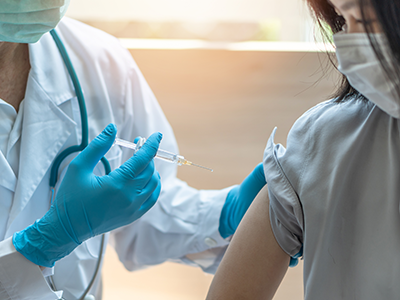Seeing children playing at the park again, hugging their friends and going to the movies is cause for celebration. As of late June, nearly 45 percent of the nation is fully vaccinated, and states with higher vaccination rates have had markedly fewer coronavirus cases. While more people need to get vaccinations and we aren’t entirely out of the woods yet, this will be the summer that we inch back to normal.
But returning to our usual summer routines isn’t as simple as putting on our swimsuits and heading out the door. We should take steps to ease into our routines safely and confidently.
Here are five tips from pediatricians for parents and caregivers to bear in mind as we send our kids to mask-free camps, vacations with friends, jobs in the community and eventually back to in-person school.
1. Make time for mental health
Being away from friends and family for 18 months and missing milestones like birthday parties and graduations have tested our children and teens. There has been a 31 percent increase in the proportion of mental health-related emergency department visits among adolescents ages 12 to 17 in 2020 compared to 2019, according to the Centers for Disease Control and Prevention.
Check in with your children about how they are feeling as pandemic life changes. It may be tempting to equate returning to activities with a return to a pre-pandemic state of mental health, but the reality may be more complicated for children.
Be aware of changes such as excessive clinginess or anxiousness about returning to activities. For older kids, be attuned to whether they continue to stay at home and isolated, glued to their screens and unable to connect with others. Ask specifically if they are feeling stressed, anxious or depressed, or if they think life is not worth living. Many parents are afraid to directly ask about suicide, fearing it may make a teen suicidal — but that is not the case, and in fact doing so is more likely to get someone the care they need.
Remember, you are not alone. Reach out to your extended community — coaches, teachers, trusted adults and/or family members for support. Also, get professional advice from a health provider such as your pediatrician or a psychologist if you suspect an issue. Just because camps and activities are opening doesn’t mean kids will emotionally bounce back right away. Continuing to prioritize their mental health will be vital.
2. Support your child’s physical health
More kids became sedentary during the pandemic lockdown, and rates of being overweight and obese increased, along with secondary complications including high blood pressure, insulin resistance and elevated cholesterol. There also has been an increase in anorexia, bulimia, food restriction and binge eating.
Ask children and teens how they feel about their appearance, what their peers are saying and how they can turn the focus from their outward appearance to what is inside. Also find ways to help build healthy eating, sleeping and exercise habits into their lives. They may need support and modeling from adults, and creative ways to resume physical activity such as family walks, exercise apps and team sports.
Finally, check in with a health-care provider if you are concerned about an excessive focus on appearance, significant changes in eating or exercise habits and recent fluctuations in weight.
3. Vaccinate your children
Covid-19 is a potential threat to children’s health, and vaccines are highly effective in preventing infection, including from the more contagious variants. A vaccine is available for young people 12 and older and is recommended by the American Academy of Pediatrics. According to the AAP and the Children’s Hospital Association, more than 4 million children in the United States have contracted covid-19, thousands have been hospitalized and hundreds have died. As pediatricians, we know that covid is not benign in children. The coronavirus vaccine is safe and effective, and it can allow young people to attend camps, summer activities and school without fear of contracting severe infection.
Because of the pandemic, many children and adolescents also are missing their routine vaccinations against other diseases, including measles, whooping cough and meningitis. An increase in communicable-vaccine-preventable diseases could affect schools returning to normal. Now is the time to schedule an appointment with your pediatrician to ensure your children’s vaccines are up-to-date.
4. Think about injury prevention
As you return to a community swimming pool, beach or lake this summer, be extra vigilant, especially if your child has missed out on swimming lessons during the pandemic. For children ages 1 through 4, drowning is the No. 1 cause of injury-related deaths, and drowning rates spike again in the teenage years. Enroll your children in swim lessons as soon as they are available, and always designate an adult “water watcher” around water. This person should be solely focused on the kids — not cooking, doing chores or using their phone. If you have a backyard pool, a fence that surrounds it will significantly reduce the chances that a child will drown. Often kids drown when they were not supposed to be anywhere near the water, so preventing access is an important layer of protection.
Many families purchased firearms during the pandemic, and as a result, parents need to be vigilant. Children are naturally curious and often can find firearms that have been hidden in the home. Talk to your child about the importance of staying away from any guns they may discover, and more important, be sure to use a gun safe or gun lock so a child cannot gain access to a firearm. As children return to their usual playdates, ask the other parents if they own firearms, and if they are securely locked up.
5. Build resilience
One of the biggest predictors of success in life is the ability to handle failure and disappointment. The pandemic has challenged us. During this time, our children can continue to learn to build critical skills in adaptability and resilience. Instead of making decisions for them or removing obstacles from their path, brainstorm with your child or teen a transition to resuming a more structured life and creating purpose: What would you like the next few months to look like? How can we overcome the loss of milestones and come up with creative new ways to celebrate? What have you learned from this time?
This past year was unlike any other. Families have shown tremendous strength and grit, but many may continue to feel the weight of the pandemic for a while longer. Take the time to reflect on what you’ve been through and be kind to yourself. Without a doubt, we all need time to heal and slowly work our way back to a post-pandemic normal.
This article originally appeared in the Washington Post.
 https://riseandshine.childrensnational.org/wp-content/uploads/2026/02/olympics-feature.png
300
400
webteam
https://riseandshine.childrensnational.org/wp-content/uploads/2017/11/childrens_riseandshine_logo.jpg
webteam2026-02-05 16:41:512026-02-06 08:51:52What the Winter Olympics can teach our children
https://riseandshine.childrensnational.org/wp-content/uploads/2026/02/olympics-feature.png
300
400
webteam
https://riseandshine.childrensnational.org/wp-content/uploads/2017/11/childrens_riseandshine_logo.jpg
webteam2026-02-05 16:41:512026-02-06 08:51:52What the Winter Olympics can teach our children



 Lee Beers, MD, was the Medical Director for Community Health and Advocacy within the Goldberg Center for Community Pediatric Health and Child Health Advocacy Institute at Children’s National Hospital.
Lee Beers, MD, was the Medical Director for Community Health and Advocacy within the Goldberg Center for Community Pediatric Health and Child Health Advocacy Institute at Children’s National Hospital.


















Leave a Comment
Want to join the discussion?Feel free to contribute!